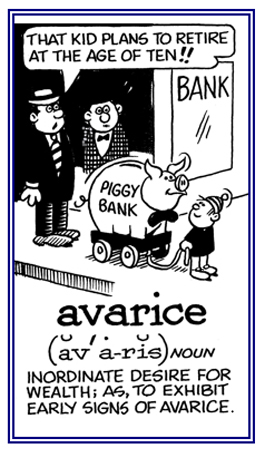avari-
(Latin: greed, greedy)
2. An excessive desire for gain; greediness after wealth; covetousness; cupidity: Paul's avarice apparently led him into unethical business deals.
3. Etymology: via French from Latin avaritia, "greedy"; from avere, "to desire".

Go to this Word A Day Revisited Index
for a list of additional Mickey Bach illustrations.
2. Descriptive of a greed for material gain or extreme desires for accumulating property: The personable young man seemed motivated by an avaricious desire to please people for the sake of the material rewards he would receive.


Go to this Word A Day Revisited Index
for a list of additional Mickey Bach illustrations.
2. Characterizing how a person does something in a greedy manner: Shareen avariciously ate as if she were starving which is why she was so overweight.
The exchange of funds for goods defines capitalism; while the love of money for its own sake defines avarism.
Those with wealth often support the hoarding of assets into hedge funds, insider trading, market manipulation and the purchase of politicians who pass legislation written by and for big business; so, such avarisms are what pass for capitalism today and although they may have made America great in the past, they are now destroying America.
2. A person who has an uncontrolled desire for almost anything; including, food, drink, money, or emotional gratifications: Glen is an avarist who likes to help people whenever he can because he always expects to receive praise for whatever he does for them.
From the Old Testament: Ecclesiastes, V, 10 (c. 250 B.C.). It is probably the origin of "The More he has, the more he wants."
It is said that the multimillionaire, John D. Rockefeller, was once asked, "How much money does it take to make a man happy?" His response: "Just a little more!"
Also: "Avarice, or greed, is never satisfied."
